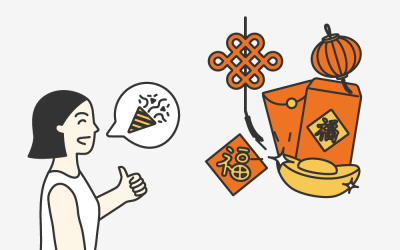Numbers play an important role in Chinese culture. We’ve already introduced 5 Chinese number-related idioms (from 1 to 5) in the previous article. Thus, we will give you detailed explanations of the next five popular Chinese idioms with numbers (from 6 to 10) in the following article.

六神无主 (liù shén wú zhǔ)
The meaning of 六(liù), 神(shén), 无(wú) and 主(zhǔ) is “six”, “god”, “none” and “master” respectively. Therefore, the literal meaning of this idiom is “six gods without a master”, which you can get by putting all these words together. It is often used to describe a person who feels perplexed or extremely upset.
Example:
- 他被明天的考试吓得六神无主
(Tā bèi míngtiān de kǎoshì xià dé liùshénwúzhǔ)
He’s so upset about tomorrow’s exam
- 考试(kǎoshì): exam
- 吓(xià): to scare

七步成诗 (qī bù chéng shī)
The last character 诗(shī) of this idiom means “poem”. In ancient China, people believed that a person was indisputably smart if he could make a poem within seven paces. As the literal meaning of this idiom is “a poem is ready within seven paces”, you can use it when you’re astonished by someone’s erudition.
Example:
- 她聪明,乖巧,七步成诗
(Tā cōngmíng, guāiqiǎo, qī bù chéng shī)
She is smart, cute and erudite

半斤八两 (bàn jīn bā liǎng)
In China, 斤(jīn) and 两(liǎng) are units used to measure weight, and both 半斤(bàn jīn) and 八两(bā liǎng) equal to 250 grams. People usually use this idiom to compare two objects, implying they are on par with each other.
Example:
- 我们的中文水平半斤八两
(Wǒmen de zhōngwén shuǐpíng bànjīnbāliǎng)
Our Chinese levels are on par with each other

十有八九 (shí yǒu bā jiǔ)
This idiom involves a combination of three numbers, which are 十(shí) -10, 八(bā) – 8 and 九(jiǔ) – 9. By looking at this combination, you can easily deduce that the literal meaning of this idiom is “8 or 9 out of 10”, which is “highly likely”.
Example:
- 我觉得他十有八九是中国人
(Wǒ juédé tā shí yǒu bājiǔ shì zhōngguó rén)
I’m pretty sure he’s Chinese

十全十美 (shí quán shí měi)
In this idiom, 全(quán) means “complete” and 美(měi) means “beautiful”. You can use it to describe something or someone that you think is impeccable.
Example:
世界上没有十全十美的人
(Shìjiè shàng méiyǒu shíquánshíměi de rén)
Nobody is perfect in this world








Very interesting info